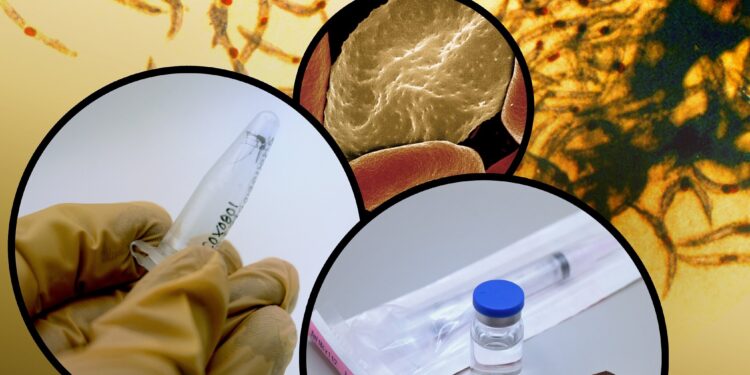Background image of malaria parasites with photo montage in the foreground showing infected red blood cells, a mosquito, and a vaccine vial. Credit: NIAID
Two trials of an experimental malaria vaccine in healthy Malian adults have shown that all three treatment regimens tested were safe. The results are published in Infectious diseases in The Lancet journal newspaper.
One trial involved 300 healthy women aged 18 to 38 who planned to become pregnant soon after vaccination. The trial began with drug treatment to eliminate malaria parasites, followed by three injections spaced one month apart of either a saline placebo or one of two doses of the experimental vaccine.
Both doses of the candidate vaccine conferred a significant degree of protection against parasitic infection and clinical malaria, which was maintained over a period of two years without the need for a booster dose – a first for a malaria vaccine.
In an exploratory analysis of women who conceived during the study, the vaccine significantly protected them against malaria during pregnancy. If further clinical trials confirm this hypothesis, the approach modeled in this study could pave the way for better methods of preventing malaria during pregnancy.
Transmitted by Anopheles mosquitoes, malaria parasites, including those of the species Plasmodium falciparum (Pf), can cause disease in people of all ages. However, pregnant women, infants and very young children are particularly vulnerable to this potentially fatal disease. Malaria parasitaemia during pregnancy is estimated to be responsible for 50,000 maternal deaths and 200,000 stillbirths in Africa each year.
The trials were co-led by researchers from the NIH’s National Institute of Allergy and Infectious Diseases (NIAID) and the University of Science, Techniques and Technology of Bamako (USTTB) in Mali.
The experimental vaccine used in both trials was PfSPZ, a radiation-attenuated vaccine based on Pf sporozoites (a life stage of the parasite), manufactured by Sanaria Inc., Rockville, Maryland. Several previous clinical trials of PfSPZ have shown it to be safe, including in malaria-endemic countries such as Mali.
In results published in 2022, for example, a NIAID-sponsored placebo-controlled trial of a three-dose regimen of the PfSPZ vaccine in Burkina Faso found that the vaccine had up to 46% efficacy that lasted at least 18 months.
In the first year of the current trial, 55 women became pregnant within 24 weeks of the third dose of the vaccine. Among these women, the effectiveness of the vaccine against parasitemia (either before or during pregnancy) was 65% in those who received the low-dose vaccine and 86% in those who received the high-dose vaccine.
Among the 155 women who became pregnant during the two-year study, the vaccine’s effectiveness was 57% for those who received the low-dose vaccine and 49% for those in the higher-dose group.
Women who received the experimental vaccine at either dose conceived earlier than those who received the placebo, although this result did not reach statistical significance, the researchers reported. The researchers speculate that the PfSPZ vaccine may prevent early malaria-related miscarriages since the risk of parasitemia during the periconceptional period was reduced by 65 to 86 percent.
“Preconception vaccination is a novel strategy to reduce mortality in women with malaria during pregnancy,” the researchers note. They plan to study the safety of PfSPZ vaccine administered during pregnancy and then examine the efficacy of PfSPZ administered before conception or during pregnancy in larger clinical trials.
“Existing measures do not protect pregnant women against malaria,” they added. “There is an urgent need for a safe and effective vaccine, and our results indicate that the PfSPZ vaccine could be a suitable candidate,” they concluded.
More information:
Halimatou Diawara et al, Safety and efficacy of the PfSPZ malaria vaccine in healthy adults and women planning pregnancy in Mali: two randomized, double-blind, placebo-controlled, phase 1 and 2 trials, Infectious diseases in The Lancet journal (2024). DOI: 10.1016/S1473-3099(24)00360-8
Additional trial information is available at clinicaltrials.gov using the identifiers NCT03510481 or NCT03989102.
Provided by NIH/National Institute of Allergy and Infectious Diseases
Quote:Malaria vaccine candidate offers long-lasting protection in trials (2024, August 15) retrieved August 15, 2024 from
This document is subject to copyright. Apart from any fair dealing for the purpose of private study or research, no part may be reproduced without written permission. The content is provided for informational purposes only.



